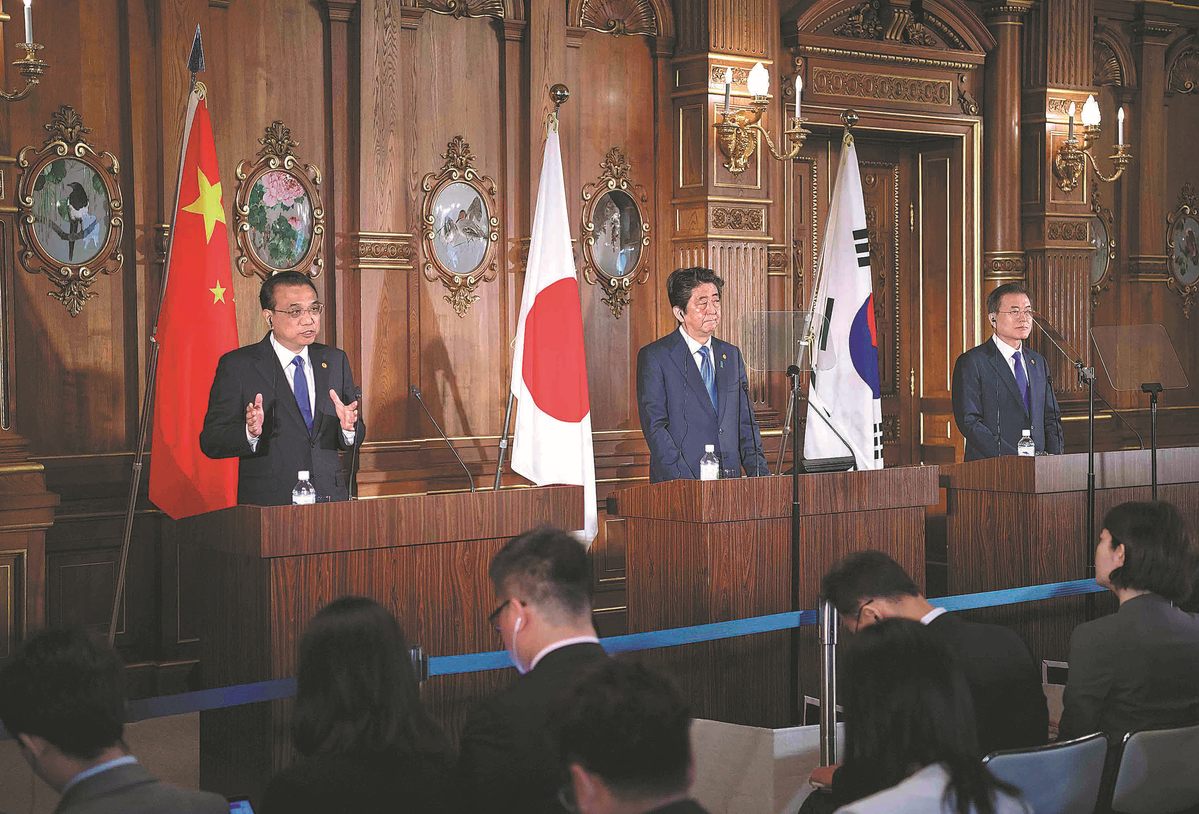
Premier Li Keqiang, Japanese Prime Minister Shinzo Abe (center) and ROK President Moon Jae-in take questions from journalists after the seventh leaders' meeting in Tokyo May 9, 2018. [Photo by Li Tao/Xinhua]
This is an editorial from China Daily.
Premier Li Keqiang will host Japanese Prime Minister Shinzo Abe and President of the Republic of Korea Moon Jae-in in China's southwestern city of Chengdu on Tuesday for the eighth China-Japan-ROK leaders' meeting.
An important platform for the three countries to coordinate their stances on regional issues, the trilateral meeting will hopefully prove to be a Christmas gift for regional cooperation and security.
Accelerating negotiations for a trilateral free trade deal is expected to top the leaders' agenda.
For the three countries, signing a trilateral FTA would help deepen the integration of their industrial chains and give full play to the complementarity of their industries. But signaling their resolve to sign a trilateral FTA agreement at an early date would also be a significant confidence builder for greater regional integration at a time when India is holding off on joining the Regional Comprehensive Economic Partnership.
Given the large number of developing countries in Asia and the acute problem of uneven and inadequate development the region faces, they can also discuss ways that trilateral cooperation can be extended and explored in fields in which the three countries have many successful experiences and know-how to share with other countries.
And given that they account for approximately 20 percent of the world's GDP and 17.5 percent of global trade, promoting trilateral cooperation and harnessing their complementarity would not only be a shot in the arm for greater regional integration but also further consolidate trade liberalization and multilateralism in the face of rising protectionism and unilateralism.
Important regional issues are also expected to feature in the meeting. Given that China, Japan and the ROK are important stakeholders in the peace and stability in Northeast Asia, they can jointly contribute to stabilizing the situation on the Korean Peninsula through communication and coordination.
Tensions on the Korean Peninsula have flared up of late as nuclear talks between the United States and the Democratic People's Republic of Korea have stalled after the February summit in Hanoi between US President Donald Trump and DPRK leader Kim Jong-un.
The US has rejected the DPRK's demands for broad sanctions relief in exchange for a step-by-step denuclearization, and working-level discussions in Sweden in October broke down in acrimony, with the DPRK calling the talks "sickening".
The recent series of missile tests conducted by the DPRK, although they did not violate the UN Security Council resolution, sent a warning to Washington, and showed Pyongyang's increasing displeasure at Washington maintaining its "old stance and attitude".
Under such circumstances, it is good to learn that China, Japan and the ROK will look to "have a constructive effect on achieving peace and stability on the Korean Peninsula" at next week's meeting.
Despite the stop-start nature of their relations, due to their differing views on territorial and wartime history issues, China, Japan and the ROK have successfully advanced cooperation in a wide range of areas.
By renewing their countries' commitments to strengthening ties and focusing on areas where they can deepen their practical cooperation, the three leaders can show next week that their countries are willing to keep their eyes on the bigger picture.

 中文
中文





